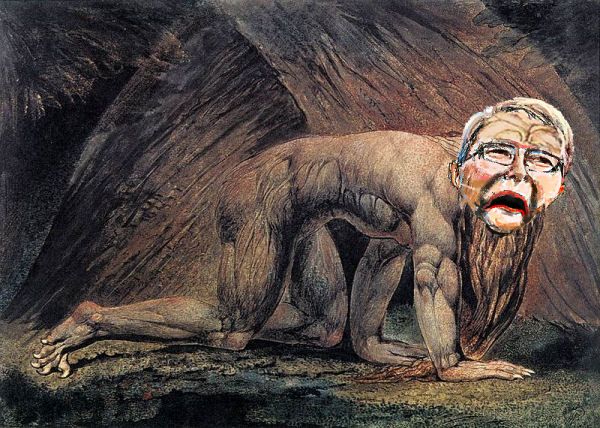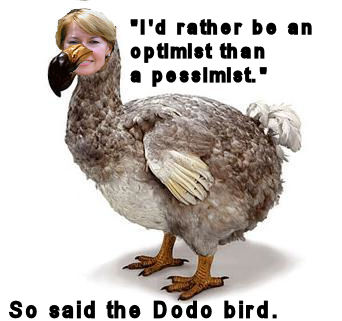I would rather be an optimist than a pessimist, said the Dodo bird
 A common line of argument from those who favor population growth in Australia is that it's all a matter of optimism versus pessimism, and that environmentalists are much too negative. But there are situations where optimism would be better named meglomania.
A common line of argument from those who favor population growth in Australia is that it's all a matter of optimism versus pessimism, and that environmentalists are much too negative. But there are situations where optimism would be better named meglomania.

Picture adapted from William Blake's Nebukadnezar

Last words of the Dodo
Weren’t, “I would rather be an optimist than a pessimist,” the famous last words of the dodo bird?"[1]
In Rudd welcomes 'big Australia'
Rudd talked about being optimistic about Australia's growing population, which he is encouraging in the face of growing democratic panic as the public feel the adverse consequences.
Because of this new parties are forming with policies to stop population growth in Australia.
A common line of argument from those who favor growth, such as economist Glenn Withers, is that it's all a matter of optimism versus pessimism, and that environmentalists are much too negative.
Ex-journalist, now Labor politician, Maxine McKew, recently told the Australian Q & A television show that, since we would all rather be optimists than pessimists, she was going to take the optimistic view on Australia's carrying capacity and on the livability of larger cities, and that to her mind ended the argument.
Optimism or meglomania
Too bad if people in Australia cannot afford water and heating or shelter - let's all remain optimists! What a negligent attitude from a person responsible for the conditions which may lead to starvation and exposure for so many.
"Doomsayers have always been wrong" say the cheerleaders of the growth lobby. Mark O'Connor identifies this attitude as coming from their vast ignorance of human history, and compares their glibness with the glibness of the Chaldeans telling Nebuchadnezzar "O King, live forever" (Book of Daniel, 3.9).
Nebuchadnezzar was an infrastructure and growth obsessed King who believed that his kingdom of bricks and mortar, and their financial foundations, would be eternal. Like Australia's Prime Minister and State Premiers, he thought he had the solutions to everything and that anyone who disagreed was not worth listening to. In the Bible, the political opposition was symbolised as a new religion, whose prosyletisers Nebuchadnezzar put down by various brutal means. The fact that an organised political opposition had formed is indicative that Nebuchadnezzar's wealth and power were based on disempowering his constituents. His key advisors learned to tell him what he wanted to hear or face the consequences. The king had dreams that were interpreted as warning him that his kingdom would crumble as would others that followed. His response was to built a huge gold statue of himself at public expense.
But Nebuchadnezzar's grandiosity was exposed for the madness it was. He was driven out of his own city and spent seven years living like a wild animal. [Ed. Apologies to wild animals who seem to lead blameless lives in reality, especially compared to politicians.]
Mark O'Connor says that one thing experience has taught him is not to trust anyone who seeks to reduce complex factual issues to optimism versus pessimism.
Hope, fear and propaganda
Vlad Stoikovich, who was recently on a population 'debate' on SBS's Insight program writes,
"Population boosters often paint the population debate as being one of HOPE verses FEAR. They, being on the side of hope, see themselves as visionaries with an unshakeable confidence in the creativity of mankind. On the side of fear, they group together -
“the villains”: NIMBYs, bigots, scaremongers and conservationists, people resistant to and fearful of change, pessimists whose innate distrust of mankind is their greatest failing.
To present the case for and against in such a light is clearly just another case of moral manipulation, an attempt by boosters with vested interests to hold the moral high ground at the expense of reasoned, logical debate. So in the interest of fairness let’s reverse their proposition and assume that boosters are on the side of FEAR and population stabilisers the side of HOPE.
Could such an argument be valid?
We only have to analyse booster arguments to deduce what it is they FEAR:
* Boosters FEAR that we cannot maintain economic growth without population growth.
* Boosters FEAR that the personal stake they have in controlling capital, land and business wealth will not be maximized.
* Boosters FEAR that we will not be able to support an aging population.
* Boosters FEAR that we will revert into a bigoted, Anglo-centric fortress Australia, which breeds suspicion and hatred of those different from us.
* Boosters FEAR strategic/military weakness and invasion from foreign powers.
So what do stabilisers HOPE for?
* We HOPE for a world in which our children can enjoy the same abundant natural environment and species that we enjoy today.
* We HOPE for an economic model which takes into account the full environmental, social and cultural impacts of our choices.
* We HOPE for an Australia whose growth is based on doing things smarter, more productively and in a way which gives all Australians the opportunity to participate and prosper.
* And the list goes on!
Boosters believe in the boundless ingenuity of humanity, they put their faith in the great scientists and machines of tomorrow, that will enable us to consume and grow without limits. But ingenuity comes in many forms and it should be recognized that before every great leap of science comes an even greater leap of philosophy . Perhaps the ingenuity they so crave is not to be found in their grand technological visions of tomorrow, but in the simple philosophical shifts now happening right under their noses."
NOTES
[1] Remark made by Robert Jameson on [email protected] on 07/06/2010 13:23


Recent comments